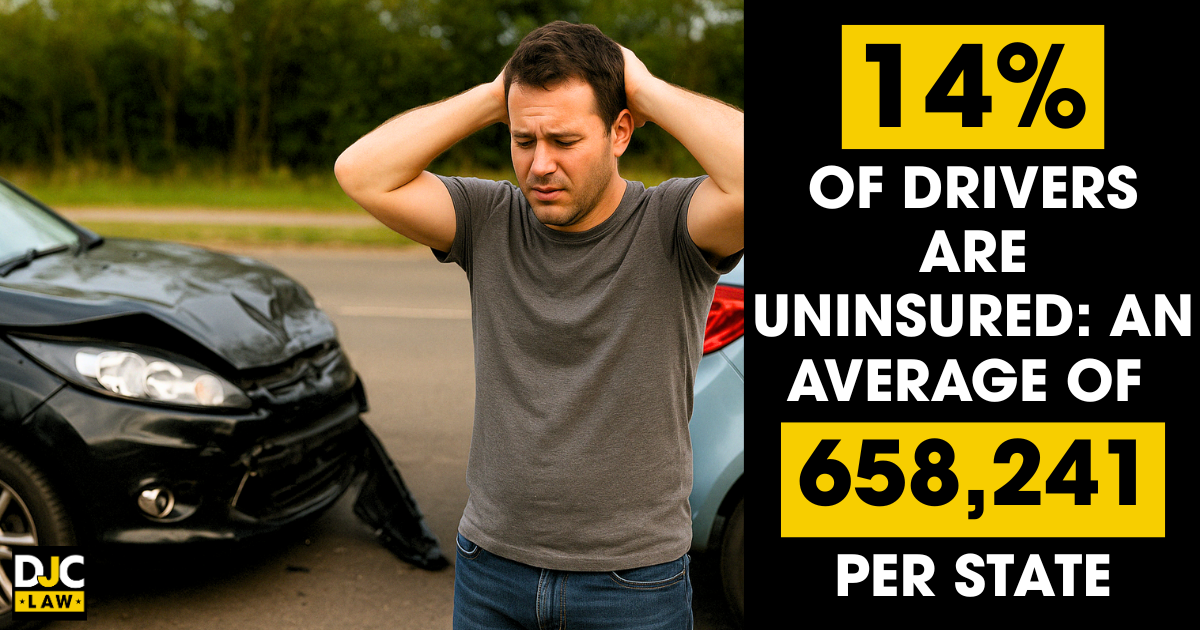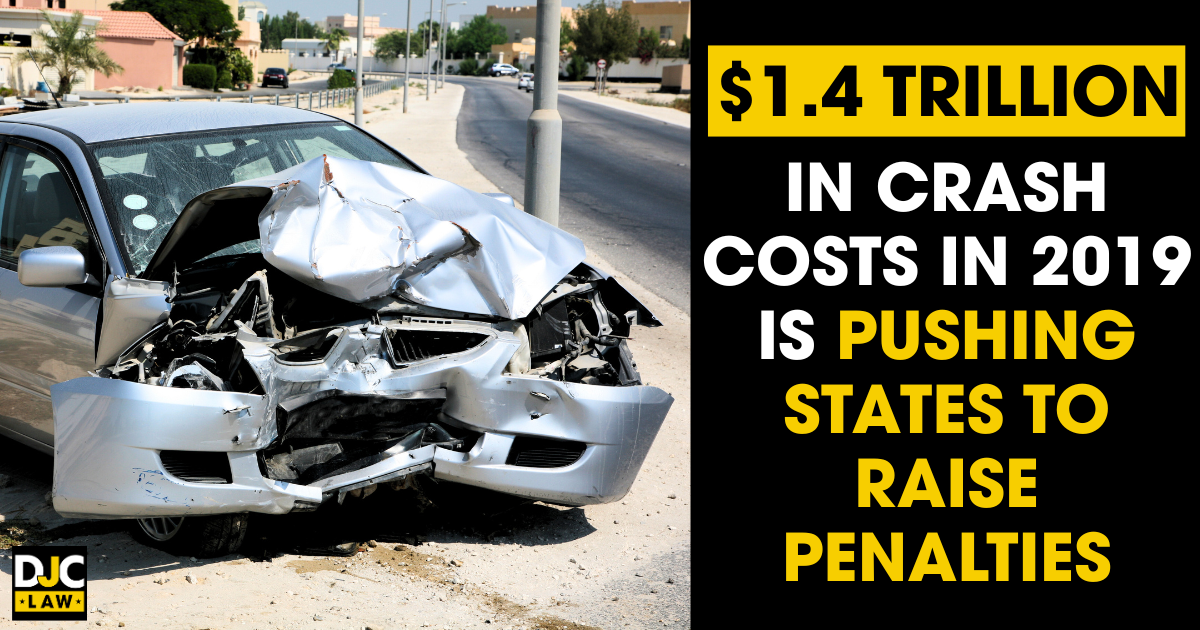
Do you need to have insurance to drive?
It might seem like a silly question, but many drivers often make this assumption that they’ll claim through the at-fault driver’s insurance policy. But the fact is that the Insurance Research Council found that at least 14% of all drivers don’t carry any form of auto insurance.
AutoInsurance.com estimated that this averages out to 658,241 drivers per state. If an uninsured driver hits you, you have issues, especially if you don’t have extra coverage to protect yourself. In these situations, consulting with a knowledgeable car accident attorney can help ensure your rights and interests are protected.
In this guide, we’ll discuss whether you need insurance, what the penalties are if you’re caught without it, and what to do if you’re hit by a driver who doesn’t have insurance.

Key Takeaways
- Driving without insurance is illegal in 49 of 50 states, with New Hampshire being the sole exception.
- All drivers must have insurance that meets their state’s minimum coverage requirements to operate a motor vehicle on public roadways.
- Punishments vary between states, with fines, vehicle impoundment, license suspension/revocation, and even jail time for driving without a valid policy.
- Repeat offenses or getting into a motor vehicle accident without insurance will cause the penalties to escalate dramatically, with uninsured drivers risking lawsuits being filed against them and civil penalties.
- Without insurance, you have no protection if you’re in an accident. If you’re at fault, you could be sued, resulting in your wages being garnished and your assets being put at risk of seizure. If you’re not at fault, all costs will still come out of your own pocket.
- If you’re pulled over for not having insurance, speak to an attorney who can help you appeal the penalties and have them reduced or dismissed.
What it Means to Drive Without Insurance
Driving without valid insurance means operating a motor vehicle on a public roadway without meeting your state’s minimum coverage requirements. In Texas, this means that you don’t have the minimum auto liability coverage requirements, which are $30,000 per person, $60,000 per accident, and $25,000 for property damage.
Being uninsured means you’re putting yourself at risk of significant legal consequences. Every state requires you to carry insurance other than New Hampshire, so you take an enormous risk if you don’t have a valid policy.
Legal Definition and Implications
States typically follow a three-way legal definition for someone driving without car insurance. Firstly, you’re operating a motor vehicle without an active liability insurance policy that meets your state’s minimum. Secondly, you can’t provide proof of insurance when registering your vehicle, after a crash, or during a routine traffic stop. Finally, you have a lapsed or canceled policy.
All these legal definitions apply to all drivers on public roadways. The auto insurance requirement doesn’t apply to your own private land or private land where you’re driving with the owner’s permission.
The implications of driving without insurance include fines, license suspension, vehicle impoundment, and even criminal charges.
Why Insurance is Mandatory for Drivers
Mandatory auto insurance protects everyone on the road. With AAA estimating that there are 255 million drivers on the roads, insurance protects accident victims and at-fault drivers from the penalties of getting into an accident.
So, what are the benefits of a minimum auto insurance requirement?
- Protects accident victims by ensuring they get compensated for their losses.
- Remove the need to file personal injury lawsuits every time you have a crash.
- Protects you from the financial ruin of medical bills and liability claims.
- Speeds up the claims process.
- Reduces hit-and-run risks by putting mandatory coverage in place.
New Hampshire is the sole exemption for drivers, with the state not requiring auto insurance. Until July 2024, Virginia also had a similar exemption, with drivers able to pay a fee instead of carrying auto insurance.
State-Specific Penalties for Driving Without Insurance
| State | Penalty for No Insurance |
|---|---|
| Alabama | $500 fine and suspension |
| Alaska | $500 fine and suspension |
| Arizona | $500 fine and suspension |
| Arkansas | $100 fine and suspension |
| California | $100 to $500 fine and suspension |
| Colorado | $500 fine and suspension |
| Connecticut | $100 to $1000 fine and suspension |
| Delaware | $1500 fine and suspension |
| Florida | $150 to $500 fine and suspension |
| Georgia | $200 to $1000 fine and jail time |
| Hawaii | $500 fine and service |
| Idaho | $75 to $1000 fine and jail |
| Illinois | $500 to $1000 fine and three-month suspension |
| Indiana | $250 fee and 90-day suspension |
| Iowa | $250 fine and suspension |
| Kansas | $300 to $2500 fine and jail |
| Kentucky | $500 to $1000 fine and revocation |
| Louisiana | $100 to $500 fine and impoundment |
| Maine | $500 fine and suspension |
| Maryland | $500 fine and jail time |
| Massachusetts | $500 to $5000 fine and jail |
| Michigan | $200 to $500 fine |
| Minnesota | $200 to $1000 fine and jail |
| Mississippi | $100 to $500 fine |
| Missouri | $300 to $1000 fine and suspension |
| Montana | $250 to $500 fine and jail |
| Nebraska | $100 to $500 fine |
| Nevada | $250 to $1000 fine |
| New Hampshire | No insurance required unless in accident |
| New Jersey | $300 to $1000 fine and service |
| New Mexico | $300 fine and jail |
| New York | $1500 fine and jail |
| North Carolina | $50 to $150 fine and suspension |
| North Dakota | $150 to $5000 fine and jail |
| Ohio | $100 to $500 fine and suspension |
| Oklahoma | $250 fine and jail |
| Oregon | $135 to $1000 fine and SR-22 |
| Pennsylvania | $300 fine and suspension |
| Rhode Island | $100 to $1000 fine and suspension |
| South Carolina | $100 to $200 fine and jail |
| South Dakota | $500 fine and jail |
| Tennessee | $100 to $300 fine and suspension |
| Texas | $175 to $350 fine and SR-22 |
| Utah | $400 to $1000 fine and SR-22 |
| Vermont | $500 fine and suspension |
| Virginia | $600 fee and SR-22 |
| Washington | $250 fine and suspension |
| West Virginia | $200 to $5000 fine and jail |
| Wisconsin | $500 fine and suspension |
| Wyoming | $250 to $750 fine and jail |
Overview of the Variation in State Laws
All states vary in how they treat the offense of driving without insurance. The most common variations are in the minimum liability limits, fines, vehicle impoundment, and whether you can be issued with criminal charges.
For example, Texas follows the 30/60/25 model for minimum public liability insurance. In contrast, Florida doesn’t require any bodily injury liability for drivers but does mandate Personal Injury Protection (PIP) and Property Damage Liability (PDL) coverage.
Penalties in High-Compliance vs. Low-Compliance States
It should surprise nobody that the rate of uninsured motorists is lower in high-compliance states. For example, Hanover Insurance found the average rate of uninsured drivers is just 4.5% in Maine vs. 26.7% in Florida.
The difference in compliance often comes from the significantly greater penalties in high-compliance states. However, there’s also a socioeconomic side to this. It should come as no surprise that poorer states, like Mississippi, have lower compliance rates.
Furthermore, there’s also the issue of relatively lax enforcement in some states and the difference in auto insurance premiums. Since states have a broad mandate to enforce auto insurance requirements, this is why we see such considerable differences.
Consequences of Driving Without Insurance in Different Scenarios
How a driver is treated for not having insurance often depends on the scenario. Penalties tend to be greater if you’ve been involved in an accident compared to a routine traffic stop. Moreover, how you’re treated will depend on the state.
Let’s discuss three of the most common scenarios you might come up against.
Being Pulled Over by Law Enforcement
Routine traffic stops are a common part of traffic enforcement. According to The Stanford Open Policing Project, there are an estimated 50,000 traffic stops daily. If you can’t provide proof of insurance, you can be ticketed on the spot.
First-time offenders usually receive a fine, but stricter states might impound your vehicle and suspend your license and registration. Some states may even impose SR-22 requirements on the vehicle owner and their registered vehicle. Note that these punishments can be imposed even if you have insurance but no proof.
Typically, the penalties are waived if you can provide proof of insurance in court within a set period.
Accidents While Uninsured: Who is Liable?
The strictest penalties for driving without insurance are reserved for those involved in accidents. The penalties escalate significantly, including criminal charges, if you’re the one who’s at fault.
The penalties will usually depend on whether you caused the accident. If you caused the accident, the injured party can sue you for medical bills, lost income, property damage, pain and suffering, and more. Plus, without insurance, you’ve got no protection, which could result in your salary being garnished or even bankruptcy.
If you weren’t at fault, you can still be fined and have your license suspended. Moreover, you may be unable to recover damages. For example, states like California and Michigan have “No Pay, No Play” laws.
In these states, you’re heavily restricted from claiming financial compensation, even if you’re 100% innocent.
Impact of Multiple Offenses on Penalties
Penalties will escalate for driving without insurance if you’re a repeat offender. The penalties are often the same but far more punishing.
Generally, you can expect fines to rise to over $1,000, longer license suspensions, and even vehicle forfeiture. If your state imposes SR-22 filing requirements, these requirements will be put in place for longer.
Note that some states consider repeat offenses of this nature to be misdemeanors. Depending on the class of misdemeanor, you could receive mandatory jail time.
Penalties By State: A Comprehensive Look

States vary heavily in how they punish drivers for operating a motor vehicle without insurance. With the National Highway Traffic Safety Administration (NHTSA) reporting the total cost of motor vehicle crashes reaching $1.4 trillion in 2019, more and more states are increasing their penalties.
To give you an overview of the differing approaches of the states to no auto insurance penalties, here’s a rundown of some of the contrasts.
High-Penalty States and Their Enforcements
Some states take an extremely dim view of driving without insurance and impose strict penalties from the get-go. Using the relevant state laws, here’s how four states punish drivers without insurance:
- Delaware – Delaware can issue fines of up to $4,000 and suspend your license for up to six months.
- Connecticut – Connecticut not only issues fines and license suspension but also reserves the right to imprison drivers for up to three months.
- Georgia – Offenders in the Peach State face a relatively minor fine of $185, but they can also lose their driving privileges and face jail time.
- New Jersey – The Garden State imposes enormous penalties even for a first-time offense. If you get pulled over and convicted for the first time, your license can be suspended for up to a year, and you could be forced to do community service. Following penalties could include up to $5,000 in fines.
States With Lenient Penalties and Possible Loopholes
In contrast, other states opt for a softer touch approach. The most obvious example is New Hampshire, which is the only state that doesn’t require you to hold an auto insurance policy. If you’re in an accident, you must present proof of financial responsibility.
Another example is Virginia. Up to July 2024, drivers could avoid taking out auto insurance and pay a $500 annual fee for the right to do so, essentially acting as a form of self insurance where you accept that you might be personally liable. That’s now changed, but Virginia remains one of the more lenient states.
Tennessee also sets its fines at $300 and a possible but rarely enforced suspension of your driving license.
Additional Implications of Driving Without Insurance
Driving without insurance may seem like an easy way to save money because of the rocketing cost of auto insurance. According to MarketWatch, the average cost of full coverage is $2,386 or $716 for minimum liability coverage, assuming good credit and a squeaky-clean driving history.
The problem is that all those financial advantages disappear if you’re in an accident or get pulled over. You’re also risking a cascading array of legal consequences that could follow you around for years to come.
Financial Consequences: Fines and Other Costs
Fines from the state represent only a fraction of the costs drivers could face when caught without insurance. Hefty fines are just the tip of the iceberg, especially if it’s a subsequent offense. Many forget the other costs that come into play, including court, towing, impound, and license reinstatement costs.
Here’s what you could face in terms of straight costs:
- Fines – Your state will issue a fine, which could be a few hundred dollars for a first offense. A second offense may incur face enormous fines, with Massachusetts offering a fine ranging up to $5,000.
- Towing and Impound – If your state impounds your vehicle, you’ll also be on the hook for the towing, storage, and release costs. This adds up to a few hundred dollars just to get your vehicle back.
- License Reinstatement Fees – States that suspend your license will also charge a reinstatement fee to get it back. Fees could be as high as $300, with even higher fees if you also have to pay a reinstatement fee for your vehicle registration.
- Court Costs – Going to court also means covering their fees. Although they aren’t the highest cost you’ll face, it’s still more money on top of what you’ve already lost.
- SR-22 – States may impose SR-22 requirements on drivers, which is a certificate proving that you have insurance. Your auto insurance premiums will rise, and insurers usually charge extra to file this certificate.
None of these factors affect what happens if you’re involved in an accident. With no insurance, you’re personally responsible for all your medical costs, property damage, and personal injury lawyer defense fees.
And these costs become even greater if you’re the one who’s at fault. Courts can garnish your salary and seize your assets to cover a judgment. You might even be forced to declare bankruptcy.
Impact on Driving Record and Insurance Rates
Not having insurance will appear on your driving record, allowing auto insurers to see that you’ve been charged with this violation in the past.
In states with a points system, expect to receive points on your license. If you’ve accumulated too many within a specific period, this could be what pushes you over the edge and sees your license suspended or revoked.
Unfortunately, this type of mark on your driving record gives you the “high-risk driver” label, which will increase your auto insurance premiums. Some insurers may even refuse to provide coverage at all.
For as long as it remains on your record, you could face elevated premiums for years to come, adding up to thousands of dollars annually.
Legal Repercussions and Court Costs
Other than the financial aspect, there are also the legal repercussions. Most states require you to attend court over not having insurance, especially if you were involved in an accident. Alongside administrative fees, you face potential jail time, especially if you’re charged with a higher-level misdemeanor or a felony.
Civil lawsuits could also result if you were an at-fault driver in an accident. The other party has the right to sue you personally. This could result in garnishment, a lien placed on your home, or the seizure of assets, including your bank accounts.
How to Avoid Penalties for Driving Without Insurance
The penalties for driving without insurance can upend your life for years to come. That’s why the best way to think of insurance isn’t as a legal requirement but as comprehensive financial protection.
Always follow your state’s minimum insurance requirements. In many cases, it’s strongly recommended that you exceed them to avoid paying out-of-pocket costs beyond your policy’s maximum limit.
So, how do you stay protected?
Understanding Your State’s Insurance Requirements
Every state has its own minimum insurance requirements. Begin by understanding what the legal minimum is where you live and the types of mandatory coverage you need.
For example, Texas only requires liability coverage, whereas Florida requires you to have Personal Injury Protection (PIP) coverage. You should also be aware of proof of insurance requirements if you’re stopped, such as whether you need physical or digital proof.
The best way to find out what’s required of you is to visit your state’s Department of Motor Vehicles website.
Maintaining Continuous Coverage: Tips and Best Practices
Don’t make the mistake of letting your policy lapse. Even if it’s accidental, you’ll still face penalties, even if you’ve allowed your coverage to expire for a single day.
So, what’s the best way to ensure continuous coverage?
- Set reminders for your policy’s expiration date.
- Utilize your insurer’s automated reminders.
- Use an autopay function to ensure on-time premium payments.
- Ensure your billing information is updated to avoid payments being declined.
- Notify your insurance company if you’re selling your vehicle.
Insurers have more built-in tools than ever to provide regular reminders via SMS and email, so make good use of them.
Exploring Affordable Insurance Options
Data from NASDAQ shows that the cost is the leading reason drivers go without insurance. Over the years, auto insurance costs have soared, leading to many under-pressure Americans taking a chance and not holding insurance at all.
Unfortunately, this is an industry trend, but there are ways to find affordable insurance, including:
- Shopping around using a comparison engine.
- Using an independent agent who can sweep the whole market.
- Adjust your coverage, especially if you have an older vehicle.
- Taking advantage of discounts, including safe driver, good student, and telematics-based policies.
Another option is to use any state-supported help that might be available. Not every state has these programs in place, but low-income Americans could be eligible for help. For example, California’s Low-Cost Auto Insurance (CLCA) program provides more affordable liability coverage that’s means-tested based on income.
How to Handle a Situation When Caught Driving Without Insurance
Getting pulled over by a traffic officer and being unable to prove that you’ve got insurance leaves you in a quandary. What do you do in this situation?
How you respond and what you do next will have a big impact on the penalties you face. Shout and scream, and you’ll likely get the maximum available penalty. Be polite and apologetic, and you may receive some grace.
Steps to Take After Being Pulled Over
The first piece of advice is to avoid arguing with the police officer and provide your license and registration. If asked, be honest about the fact that you don’t have insurance. What happens next depends on your state and the office in question.
Generally, you may be issued a ticket, and if those are the rules in your state, your vehicle might be impounded. If you have insurance but no proof, the officer might allow you to get rid of any penalties by submitting proof later.
Your citation will tell you the charge, how to pay the fine/proof of insurance, and your court date, if relevant. We also recommend hiring a traffic attorney for your next steps.
How to Appeal Fines and Penalties
Drivers with extenuating circumstances may appeal any fines and penalties imposed. It’s your legal right to appeal if you believe you’ve been treated unfairly. Approach a lawyer with experience in this area for more information on your chances and whether you should appeal.
For example, you might get your penalties reduced if you immediately purchase insurance, demonstrate proof of financial hardship, or claim that the fines were excessive or you were unlawfully stopped.
Sometimes, the judge might reduce your fine or allow you to attend a driver’s education course to avoid the more significant penalties of seeing your license suspended.
Getting Back on Track: Regaining Insurance Coverage
Regardless of what happens next, you must secure coverage meeting your state’s minimum limits if you want to drive again legally. This may include shopping around for a policy that fulfills your state’s SR-22 requirements.
Above all, never lie to your insurer about your charge or the reasons for not having insurance, as they might find out later and deny you coverage. If standard companies don’t cover you, be prepared to look at more expensive high-risk carriers.
If your driver’s license and vehicle registration was also suspended, you’ll also have to:
- Pay all relevant fees, such as reinstatement costs for your license and license plates.
- File required forms, like an SR-22 to prove that you’re financially responsible.
- Provide proof of valid coverage.
Be prepared to pay higher premiums for the next few years. There’s no getting around this other than by driving safely and being patient.
Final Thoughts on Driving Without Insurance
Driving uninsured is illegal in 49 states and puts your future at risk. Whether you’re in an accident or not, the penalties for not having insurance can change your life for years to come. However, people do make mistakes, which is why proper legal representation is there to protect you.
If you believe you’ve been unfairly punished or need help navigating the legal system, DJC Law is there. To learn more about your legal options, contact us for a free consultation now if you’re facing charges for driving without insurance.
FAQs About Driving Without Insurance
What to do if you can’t afford insurance?
Many states offer low-cost insurance policies for people on low incomes. Provide proof of financial hardship, and you may qualify for state-sponsored coverage options to enable you to drive legally. The other option is to reduce your coverage and only take out the absolute legal minimum.
Can you be sued if you’re in an accident without insurance?
Yes, you can. Normally, claims and lawsuits are filed against the at-fault driver’s insurer. Without that shield, you assume personal liability for all costs, meaning an injured party can sue you personally for all associated losses.
What to expect from future insurance coverage after a lapse?
It depends on your reasons for allowing your insurance to lapse. Allowing it to lapse because you aren’t driving shouldn’t impact your premiums. Likewise, if your policy lapses and you aren’t caught, you should be fine, but if you’re cited for driving with a lapsed policy, expect your premiums to rise.
It’s also worth mentioning that allowing your policy to lapse may cause you to lose out on any loyalty discounts your insurer offers.



